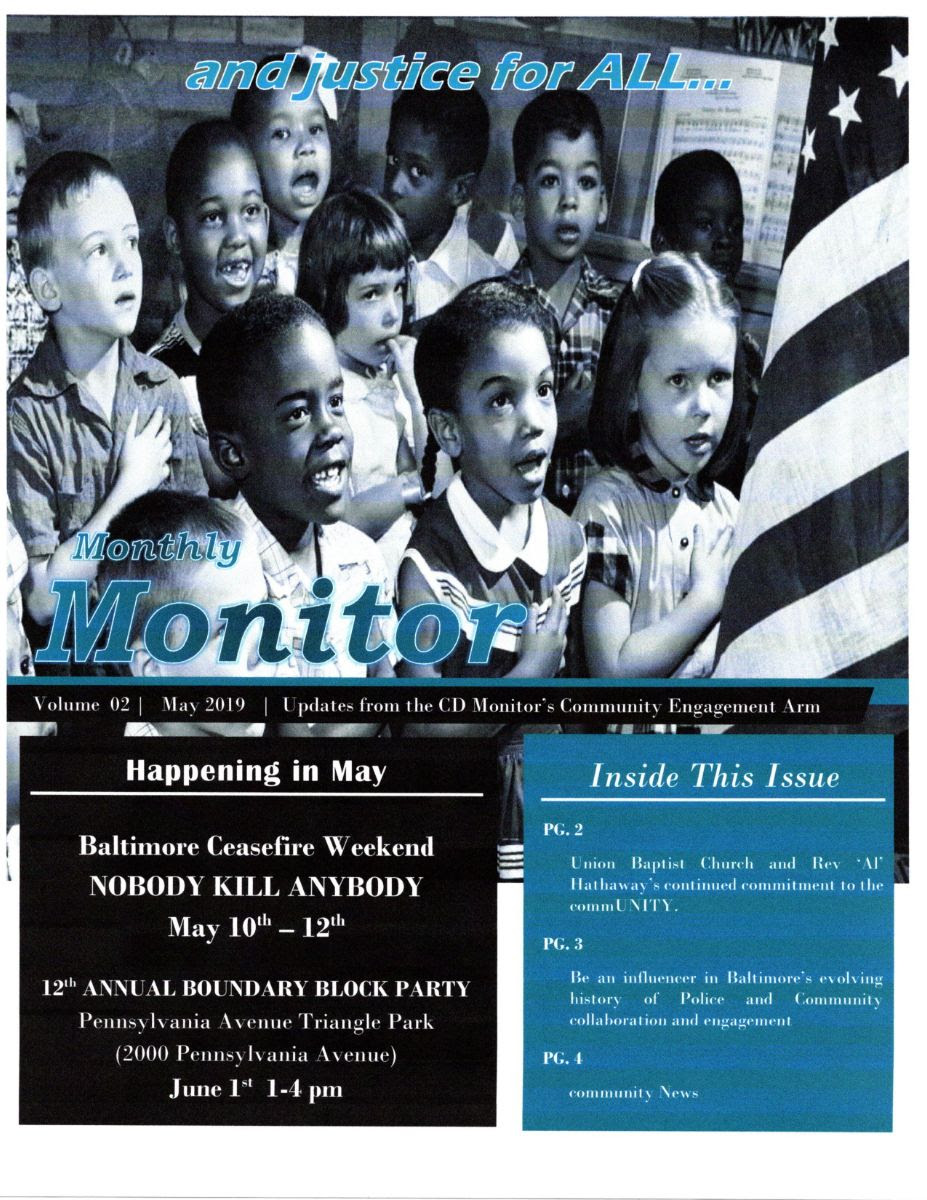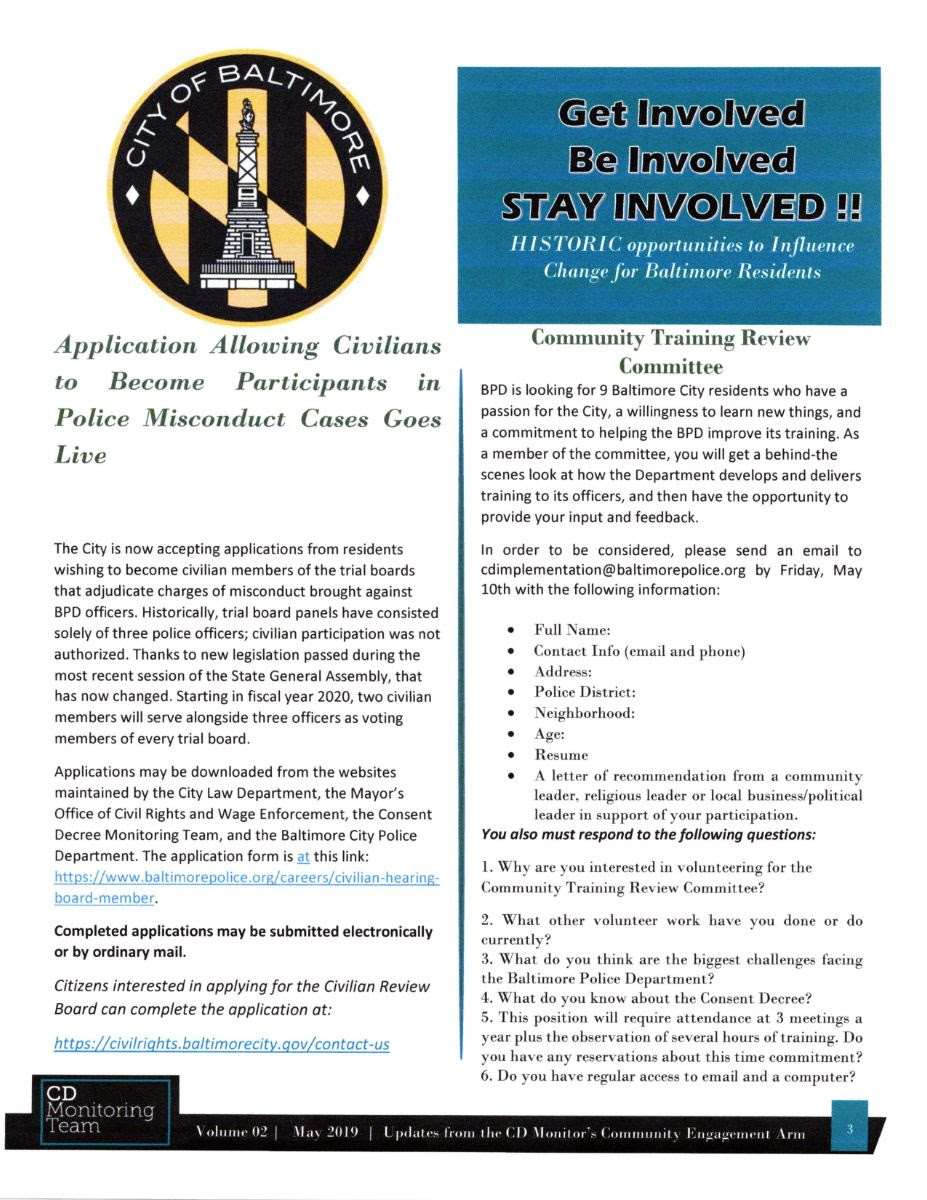Join the CD Monitoring Team for their seventh Quarterly Community Forum on Tuesday, October 15, 2019 from 6:00PM- 8:00PM to provide Baltimoreans with an update on our work! The event will be held at Saint Veronica Roman Catholic Church, 806 Cherry Hill Road, Baltimore, MD 21225
Notice of Brief Postponement of Final Comment Period for Policy 1809
Exculpatory Evidence Disclosure Requirements
Based on the extensive, thoughtful feedback BPD has received regarding the initial draft of Policy 1809, Exculpatory Evidence Disclosure Requirements, as well as discussions BPD has had with prosecuting authorities about providing prosecutors secure, confidential, electronic access to BPD's disciplinary records database, BPD needs more time to work with the Monitoring Team and the Department of Justice to revise the draft policy and issue a final draft for additional public comment. Accordingly, the deadline to release the final draft policy for additional public comment has been extended to August 13. This second and final comment period will run through August 27.
May 2019 Monthly Newsletter
Quarterly Community Forum
Join the CD Monitoring Team for their Fifth Quarterly Community Forum on Tuesday, April 2, 2019 from 6:00PM- 8:00PM to provide Baltimoreans with an update on its progress. The event will be held at Union Baptist Church, 1201 Druid Hill Ave., Baltimore, MD, 21217.
Quarterly Community Forum
Join the CD Monitoring Team for their Fourth Quarterly Community Report Forum on January 22, 2019 to provide Baltimoreans with an update around their Second Semi-Annual Report from 6:00PM- 8:00PM. The event will be held at Edgewood Lyndhurst Recreation Center, 835 Allendale St., Baltimore, MD 21229
Quarterly Community Report
Join the BPD Monitoring Team for their Third Quarterly Community Report Forum to provide Baltimoreans with an update around their work on October 1, 2018 from 6:00PM- 8:00PM. The event will be held at Langston Hughes Community, Business & Resource Center located at 5011 Arbutus Avenue, Baltimore, MD 21215
STATEMENT OF THE BALTIMORE POLICE CONSENT DECREE-MONITORING TEAM IN RELATION TO THE INCIDENT IN EAST BALTIMORE on 8/11/18
The Baltimore Police Consent Decree Monitoring Team has reviewed the video of a violent incident apparently involving Baltimore Police officers in East Baltimore earlier today. The video is disturbing. The incident warrants immediate investigation by the command staff of the Baltimore Police Department. Earlier this evening, Consent Decree Monitor Kenneth L. Thompson expressed that view directly to Acting Police Commissioner Gary Tuggle.
At its core, the Consent Decree requires that police activity be conducted in accordance with the United States Constitution. Operating as an arm of the United States District Court for the District of Maryland, the Monitoring Team will be watching closely in the coming days to see how he Department responds to and investigates this incident. This is an important moment for the Baltimore Police Department. It is an opportunity for the Department to show the Moniroting team, the Court, and the community that when its officers are involved in an incident that raises serious questions about compliance with Department policies regarding the use of force (not to mention the U.S. Constitution) it will move swiftly to conduct a thorough, transparent, and fair investigation.
Baltimore Police Consent Decree Monitoring Team
Second Quarterly Community Report
Join the BPD Monitoring Team for their Second Quarterly Community Report Forum to provide Baltimoreans with an update around their work on July 18, 2018 from 6:00PM- 8:00PM. The event will be held at Sacred Heart of Jesus Parish located at 600 South Conkling Street, Baltimore, MD.
Baltimore Police Monitoring Team Announces Schedule for Progress Reports to Judge James K. Bredar
(Baltimore, MD) – After consultation with the Baltimore Police Monitoring Team, U.S. District Judge James K. Bredar has set a schedule over the next year for the Monitoring Team and the parties to update the Court on the Baltimore Police Department’s compliance with the Consent Decree. Judge Bredar is overseeing the Consent Decree’s implementation. The schedule includes both formal public hearings, to be held quarterly, and informal progress reports, which will be delivered to Judge Bredar in his chambers on a monthly basis.
At the public hearings, BPD, DOJ and the Monitoring Team will each provide a report on BPD’s progress toward achieving the objectives of the Consent Decree. The initial public hearings will necessarily focus on the areas targeted for reform in the First-Year Monitoring Plan. However, the public hearings will also provide an opportunity for the parties and Monitoring Team to update the Court regarding BPD’s progress toward achieving all of the objectives of the Consent Decree.
The public hearings will be held at 10 a.m. in Courtroom 1A at the United States Courthouse in Baltimore, located at 101 West Lombard Street, on the following dates:
- April 13, 2018
- July 26, 2018
- October 9, 2018
- January 10, 2019
The monthly meetings in Judge Bredar’s chambers will each focus on a discrete area of the Consent Decree. At every meeting, BPD, DOJ and the Monitoring Team will provide its own report to Judge Bredar about the progress BPD has made toward achieving the reforms required by specific provisions of the Consent Decree and the additional measures, if any, BPD must take to achieve and sustain substantial compliance in that area. Because these will be working meetings among BPD, DOJ and the Monitoring Team, under the supervision of the Court, they will not be open to the public. However, the parties and the Monitoring Team will include all of their meeting reports in their presentations at the quarterly public hearings.
The meetings with Judge Bredar will be held on the following dates over the next year:
- February 2, 2018
- March 2, 2018
- April 6, 2018
- May 29, 2018
- June 5, 2018
- August 14, 2018
- September 6, 2018
- October 2, 2018
- November 15, 2018
- December 17, 2018
- January 3, 2019
The first several meetings will address areas that Judge Bredar and the Monitoring Team have prioritized based on input from community members (including police officers), DOJ’s investigative findings, and their own preliminary assessments. These are areas of critical importance to restoring public trust in BPD and ensuring that BPD has in place the proper institutional foundation to achieve long-term success under the Consent Decree.
The February 2 session will focus on transportation of persons in custody. Judge Bredar will address this issue first because it is critical that BPD ensure that its policies, procedures and practices protect the safety and security of persons in their custody (as well as officers) during transportation.
The March 2 session will address BPD misconduct investigations and discipline. The Consent Decree recognizes—and recent events demonstrate—that fortifying BPD’s internal affairs function is crucial to achieving sustainable institutional reform. Without a credible, robust system for holding officers accountable for unconstitutional and otherwise unlawful conduct, the changes the Consent Decree mandates in important areas like stops, searches and arrests, impartial policing, and use of force are likely to prove elusive.
The April 6 session will address stops, searches and arrests. One of DOJ’s principal findings was that BPD engaged in a pattern-or-practice of stopping, searching and arresting individuals in violation of the Constitution. Ensuring that BPD’s routine interactions with civilians comply with the law is vital to achieving compliance with the Consent Decree and restoring public trust in BPD.
The reports made at the February, March and April meetings with Judge Bredar will be incorporated into the public presentations made by BPD, DOJ and the Monitoring Team at the initial quarterly hearing at the United States Courthouse on April 13.
Judge Bredar will adopt a similar schedule for public hearings and in-chambers meetings with BPD, DOJ and the Monitoring Team in subsequent years.
###
The Baltimore Police Monitoring Team oversees the implementation of the Consent Decree – a judicially-enforceable agreement – between the Baltimore City Police Department, the City of Baltimore and the United States. The Consent Decree requires BPD to adopt a number of specific reforms aimed at ensuring effective, safe, and constitutional policing. The Monitoring Team’s job is to help the Court gauge whether, consistent with the Consent Decree’s objectives, BPD is achieving meaningful reform by making tangible changes in its policies and practices for the benefit of Baltimoreans. The Monitoring Team also provides technical assistance to BPD as it seeks to implement the reforms required by the Consent Decree. The Monitoring Team includes specialists in policing and police reform, civil rights enforcement, psychology, social science, organizational change, data and technology, and community engagement.
Baltimore Police Monitoring Team Issues Draft First-Year Budget for Public Comment
(Baltimore, MD) – The Baltimore Police Monitoring Team has issued for public comment a draft first-year budget, which estimates the time and expenses needed to accomplish the team’s work under the first-year monitoring plan. The first-year monitoring plan, a draft of which was issued for public comment on January 9, is intended to guide the initial efforts of the Baltimore Police Department (BPD) to comply with the requirements of the Consent Decree BPD entered into with the United StatesDepartment of Justice (DOJ) last year. The draft budget and the draft monitoring plan can be found at www.bpdmonitor.com/first-year-monitoring-plan.
The public comment period on the draft budget runs from January 29 through February 9. The public comment period on the draft monitoring plan is correspondingly being extended through February 3.
Comments on the draft budget can be submitted by completing a survey form online at https://www.surveymonkey.com/r/FirstYearBudget. The draft budget located at www.bpdmonitor.com/first-year-monitoring-plan contains instructions on how to submit comments electronically, in person, and by mail.
The Monitoring Team, BPD and DOJ will consider the comments received, incorporate the comments into the budget as warranted, and submit a final proposed budget to the Court for review and approval on February 13.
###
The Baltimore Police Monitoring Team oversees the implementation of the Consent Decree – a judicially-enforceable agreement – between the Baltimore City Police Department, the City of Baltimore and the United States. The Consent Decree requires BPD to adopt a number of specific reforms aimed at ensuring effective, safe, and constitutional policing. The Monitoring Team’s job is to help the Court gauge whether, consistent with the Consent Decree’s objectives, BPD is achieving meaningful reform by making tangible changes in its policies and practices for the benefit of Baltimoreans. The Monitoring Team also provides technical assistance to BPD as it seeks to implement the reforms required by the Consent Decree. The Monitoring Team includes specialists in policing and police reform, civil rights enforcement, psychology, social science, organizational change, data and technology, and community engagement.










